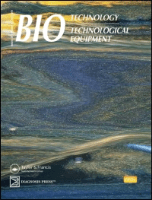
3 Biotech
Scope & Guideline
Pioneering Research in Agricultural and Environmental Sciences.
Introduction
Aims and Scopes
- Biotechnological Applications in Agriculture:
Research exploring the use of biotechnological tools to enhance crop yields, disease resistance, and sustainable agricultural practices, including the development of genetically modified organisms and biofertilizers. - Microbial Biotechnology:
Studies on the utilization of microorganisms for industrial applications, including enzyme production, bioremediation, and the synthesis of bioactive compounds. - Health and Pharmaceutical Biotechnology:
Research focused on the application of biotechnological methods to develop therapeutics, vaccines, and diagnostics for various diseases, particularly in the context of infectious diseases and cancer. - Environmental Biotechnology:
Investigations into the use of biotechnological approaches for environmental protection, including waste treatment, pollution remediation, and the sustainable use of natural resources. - Novel Biomaterials and Nanotechnology:
Studies on the development of new materials, particularly those derived from biological sources, and their applications in medicine, agriculture, and environmental management. - Bioinformatics and Computational Biology:
Research utilizing computational tools and bioinformatics approaches to analyze biological data, understand genetic mechanisms, and support experimental findings.
Trending and Emerging
- CRISPR and Gene Editing Technologies:
Research related to CRISPR and other gene-editing technologies is rapidly increasing, focusing on their applications in agriculture, medicine, and environmental sustainability. - Synthetic Biology:
Emerging studies in synthetic biology are gaining traction, emphasizing the design and construction of new biological parts, devices, and systems for innovative applications. - Microbiome Research:
There is a growing interest in understanding the role of microbiomes in health, agriculture, and environmental processes, leading to applications in probiotic development and ecosystem management. - Sustainable Bioprocessing and Circular Economy:
Research focusing on sustainable bioprocessing methods that promote circular economy principles is trending, particularly in the context of waste valorization and biorefinery. - Nanobiotechnology:
The integration of nanotechnology with biotechnology is increasingly popular, particularly for drug delivery systems, biosensors, and environmental applications. - Plant-Based Therapeutics and Nutraceuticals:
Research on the therapeutic potential of plant-derived compounds, including their applications in health and disease prevention, is on the rise, reflecting the growing interest in natural products.
Declining or Waning
- Traditional Plant Breeding Techniques:
There has been a noticeable decrease in publications focused solely on traditional breeding methods, as the field has shifted towards more modern genetic engineering and genomic approaches. - Basic Microbial Taxonomy:
Research purely focused on the taxonomy of microorganisms, without application to biotechnology, has become less prominent, overshadowed by studies with practical applications in health and environmental contexts. - Invasive Species Management:
While still important, research specifically addressing invasive species through traditional management methods has been less frequent, as attention has shifted towards biotechnological solutions and ecological restoration. - Agricultural Chemical Applications:
The focus on chemical-based agricultural solutions has waned, as there is a growing emphasis on sustainable and organic practices, including biological pest control and natural fertilizers. - Conventional Waste Management Strategies:
Studies focusing on conventional waste management techniques are declining in favor of innovative biotechnological solutions that emphasize waste valorization and resource recovery.
Similar Journals

Bioscience Journal
Advancing research for sustainable bioscience solutions.Bioscience Journal is a premier open-access publication dedicated to advancing research in the field of agricultural and biological sciences. Published by the Universidade Federal de Uberlândia, this journal has been a vital resource for the academic community since its transition to open access in 2001. With the ISSN 1981-3163, it serves as an essential platform for disseminating innovative research findings and methodologies that contribute to the sustainable development of biological resources. As of 2023, it has been categorized in the Q4 quartile in Agricultural and Biological Sciences (miscellaneous) and ranks 152 out of 221 in Scopus, placing it in the 31st percentile. The journal's scope encompasses a wide array of topics that stimulate interdisciplinary discourse and collaboration among researchers, professionals, and students alike. With engaging content and a commitment to accessibility, Bioscience Journal plays a crucial role in fostering scholarly communication and enriching the academic landscape in Brazil and beyond.

JOURNAL OF KING SAUD UNIVERSITY SCIENCE
Fostering Collaboration and Innovation in ScienceJOURNAL OF KING SAUD UNIVERSITY SCIENCE, published by Elsevier, stands as a key resource in the field of multidisciplinary research, featuring a notable Impact Factor evident from its 2023 Q1 categorization and impressive Scopus rank of #16 out of 171, placing it in the top 10% of its category. Since its transition to Open Access in 2009, this journal has fostered greater accessibility to pioneering research outcomes and innovative methodologies, enhancing knowledge dissemination globally. With an established history dating back to 1994 and an ongoing commitment to advancing scientific exploration until 2024, it serves as a vital platform for researchers, professionals, and students alike. This journal aims to publish high-quality articles that bridge various scientific disciplines, thereby encouraging collaboration and innovation. With its base in the Netherlands, JOURNAL OF KING SAUD UNIVERSITY SCIENCE not only reflects the academic rigor of its publisher but also engages a diverse international readership, making it an indispensable tool for the modern scientist.

MOLECULAR BIOTECHNOLOGY
Exploring the Frontiers of Molecular InnovationMOLECULAR BIOTECHNOLOGY, published by SPRINGERNATURE, is a pivotal journal in the fields of applied microbiology, molecular biology, biochemistry, and biotechnology. Since its inception in 1994, the journal has aimed to disseminate high-quality research that explores the intersection of molecular biology and technology, fostering advancements in biotechnology applications. With an ISSN of 1073-6085 and an E-ISSN of 1559-0305, it has established itself as a significant contributor to the scientific community, currently holding a Q3 ranking across multiple categories including Applied Microbiology & Biotechnology and Biochemistry in the 2023 metrics. Although not an open access publication, the journal remains accessible through various institutional subscriptions, providing valuable insights and findings to researchers and professionals. Given its ongoing commitment to quality and relevance, MOLECULAR BIOTECHNOLOGY serves as an essential resource for those involved in cutting-edge research and innovation in molecular biotechnology and related disciplines.

ELECTRONIC JOURNAL OF BIOTECHNOLOGY
Innovating Solutions for Health, Agriculture, and SustainabilityThe Electronic Journal of Biotechnology is a premier Open Access journal published by Pontificia Universidad Catolica de Valparaiso, Chile, dedicated to advancing the fields of applied microbiology and biotechnology. With its inception in 1998 and an unwavering commitment to sharing knowledge, the journal has garnered a respectable ranking within the Q3 quartile for both its biotechnology and applied microbiology categories as of 2023, reflecting its significance in the academic community. Researchers and professionals will find its editorial rigor complemented by a robust platform for disseminating innovative findings, fostering collaboration, and driving forward biotechnology discussions. Given its inclusive approach, having transitioned to Open Access in 2014, the journal ensures that research is accessible to a global audience, making it a valuable resource for students, academics, and industry practitioners alike. Through the publication of original research, reviews, and critical insights, the Electronic Journal of Biotechnology aims to bridge the gap between scientific discovery and practical application, ultimately contributing to advancements in health, agriculture, and environmental sustainability.

Biocatalysis and Agricultural Biotechnology
Leading the Charge in Agricultural Biotechnology InnovationsBiocatalysis and Agricultural Biotechnology, published by Elsevier, is a distinguished journal in the fields of agronomy, biotechnology, and applied microbiology. With an E-ISSN of 1878-8181, this journal has an impressive impact factor and consistently ranks in the top quadrants of Scopus, notably Q1 in Agronomy and Crop Science and Q2 in several related categories. Since its inception in 2012, it aims to bridge the gap between biocatalysis applications and agricultural practices, fostering innovative research that advances sustainable agriculture and biotechnological applications. The journal is highly regarded, with a Scopus rank of #47 out of 406 in Agronomy and Crop Science, exemplifying its significance in the academic community. As an essential resource for researchers, professionals, and students, it provides a platform for sharing cutting-edge findings that address crucial global challenges in food security, environmental sustainability, and biotechnological advancements. Located in Amsterdam, Netherlands, the journal continues to contribute to the growth and interdisciplinary dialogue in agricultural and biological sciences.

aBIOTECH
Advancing biotechnology for a sustainable future.aBIOTECH, published by SPRINGERNATURE, is a premier academic journal dedicated to advancing the fields of biotechnology, agronomy, and molecular biology. With an impressive ISSN of 2096-6326 and E-ISSN 2662-1738, this journal has established itself as a vital resource for researchers and professionals aiming to publish high-quality, impactful studies. Based in Singapore, aBIOTECH has achieved remarkable recognition, boasting a Q1 ranking in multiple categories including Agronomy and Crop Science, Biochemistry, and Genetics in the 2023 Scopus rankings. Its solid position in the 90th percentile for Biochemistry and Genetics reinforces its significance within the global scientific community. The journal covers a broad spectrum of topics relevant to both basic and applied research, facilitating a shared dialogue amongst scientists and encouraging collaborative progress in innovative biotechnological applications. The open-access nature of the journal ensures that cutting-edge research is freely available, fostering a global exchange of ideas that is critical to the advancement of science today.

REVIEWS IN ENVIRONMENTAL SCIENCE AND BIO-TECHNOLOGY
Transforming Challenges into Sustainable SolutionsREVIEWS IN ENVIRONMENTAL SCIENCE AND BIO-TECHNOLOGY is a leading academic journal published by Springer, focusing on the interdisciplinary study and advancement of environmental science and biotechnological applications. With an impressive impact factor that places it in the top quartile of its categories, this journal has consistently ranked highly (Q1) in vital fields such as Applied Microbiology and Biotechnology, Environmental Engineering, Pollution, and Waste Management and Disposal, reflecting its significant contribution to these domains. Established in 2002 and continuing to publish cutting-edge research, the journal primarily caters to researchers, professionals, and students who seek to stay abreast of the latest findings and methodologies in environmental sustainability and biotechnological innovations. While it does not currently offer open-access options, subscribers have access to a wealth of comprehensive reviews and original articles that explore the ever-evolving challenges and solutions in environmental science. Located in the Netherlands, REVIEWS IN ENVIRONMENTAL SCIENCE AND BIO-TECHNOLOGY is instrumental in bridging the gap between scientific research and practical application, promoting a collaborative approach to addressing global environmental issues.

PROCESS BIOCHEMISTRY
Transforming biochemistry with groundbreaking discoveries.PROCESS BIOCHEMISTRY is a premier journal published by Elsevier Science Ltd, dedicated to advancing the field of biochemistry, microbiology, and bioengineering. With an ISSN of 1359-5113 and an E-ISSN of 1873-3298, this renowned journal is recognized for its impactful contributions, as demonstrated by its Q2 ranking in Applied Microbiology and Biotechnology, Biochemistry, and Bioengineering categories as of 2023. Covering a wide array of topics since its inception in 1950, PROCESS BIOCHEMISTRY serves as a crucial platform for researchers and professionals to disseminate innovative findings and develop new insights in enzyme technology, metabolic pathways, and bioreactor design. Although the journal operates under a non-open access policy, it remains vital for those engaged in cutting-edge biochemical research and development. Located in the United Kingdom, it continues to facilitate scientific discourse and foster collaboration among industry experts and academic scholars worldwide.

BIOTECHNOLOGY AND BIOPROCESS ENGINEERING
Connecting Researchers to the Future of BiotechnologyBIOTECHNOLOGY AND BIOPROCESS ENGINEERING, published by the Korean Society for Biotechnology and Bioengineering, is a prominent journal in the fields of applied microbiology, biotechnology, bioengineering, and biomedical engineering. Since its inception in 1996, this journal has served as a vital platform for researchers and professionals, facilitating the dissemination of cutting-edge research and innovative applications related to bioprocesses and biotechnology systems. With an ISSN of 1226-8372, this journal is ranked within the Q3 quartile across several categories, demonstrating its relevance and impact in the academic community. Although it operates under traditional access modalities, the journal strives to provide quality and timely insights into the advancements in bioprocess technology and microbial applications, fostering a collaborative environment for knowledge exchange. Notably, it is indexed with a respectable presence on Scopus, making it a valuable resource for students and professionals seeking the latest developments in biotechnology. For more details, kindly refer to the Korean Science Technology Center, #704 Yeoksam-Dong, Gangnam-Ku, Seoul 135-703, South Korea.

BIOTECHNOLOGY & BIOTECHNOLOGICAL EQUIPMENT
Connecting Research and Real-World Applications in BiotechnologyBIOTECHNOLOGY & BIOTECHNOLOGICAL EQUIPMENT is a leading open access journal published by TAYLOR & FRANCIS LTD from the United Kingdom, dedicated to advancing the field of biotechnology since its inception in 1990. Committed to disseminating high-quality research, the journal has transitioned to open access since 2014, enhancing its accessibility for researchers, professionals, and students alike. With a notable impact in the field, it is categorized in the Q3 quartile for Biotechnology as of 2023 and ranks #193 out of 311 in the Scopus categories for Biochemistry, Genetics, and Molecular Biology. The journal aims to cover a diverse range of topics related to both biotechnological advancements and the equipment that supports them, thus fostering innovative research and practical applications in the biotechnology sector. With an evolving scope that reflects the dynamic nature of biological research, BIOTECHNOLOGY & BIOTECHNOLOGICAL EQUIPMENT plays a crucial role in bridging the gap between laboratory studies and real-world applications, making it an essential resource for anyone involved in biotechnology research.